The Czech Republic has been a popular destination for Ukrainian workers even before the Russian invasion. Many Eastern Slavs took advantage of the language similarities and often filled low-paying jobs. Most of these workers would spend several months working overtime or even holding two jobs to earn as much as possible, then return home for a few months. However, the recent wave of refugees has brought several hundred thousand people, some of whom have higher career expectations. Many sought regular employment, applying their skills and experience. Fortunately, there is still an unsaturated market for English-speaking employees, and well-paid jobs are available. Those who take them support their families or contribute to the Ukrainian war effort, yet they still have enough money and leisure time to gather and live despite their status as war refugees.
Asi to bude mojí sociální bublinou. A je pravděpodobné, že v regionech to bude úplně jinak. Každopádně v Praze se po invazi začali ve velkém usazovat také Ukrajinci, kteří trochu boří zažité stereotypy. V profesním životě mají vyšší ambice než bývalo běžné, a tak hledají kvalifikovanou práci ve firmách, kde nevadí, že neumí pořádně česky. A protože jazykově vybavených zaměstnanců je na českém pracovním trhu dlouhodobý nedostatek, myslím, že se jim to celkem daří. Výplatu asi mají stejnou jako jejich kolegové ze zbytku světa, a tak mají čas i peníze také na společenské vyžití, přestože obvykle podporují rodinu nebo válečné úsilí své rodné země, případně obojí.
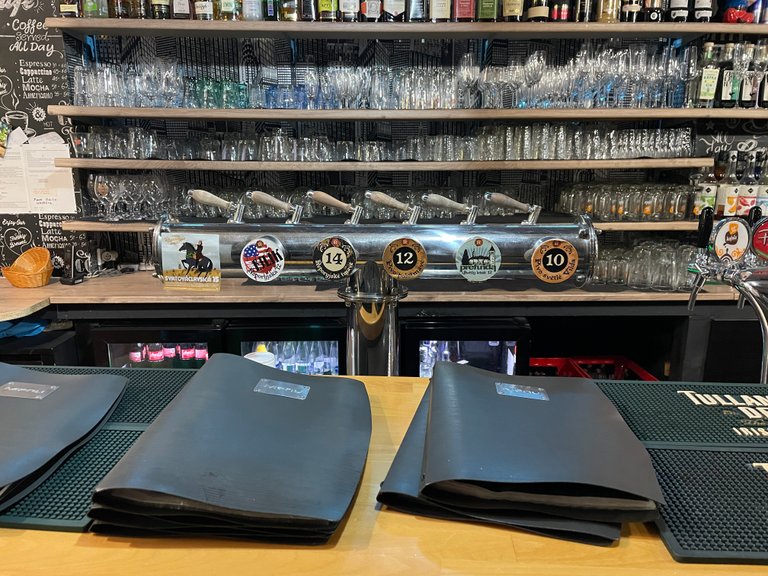
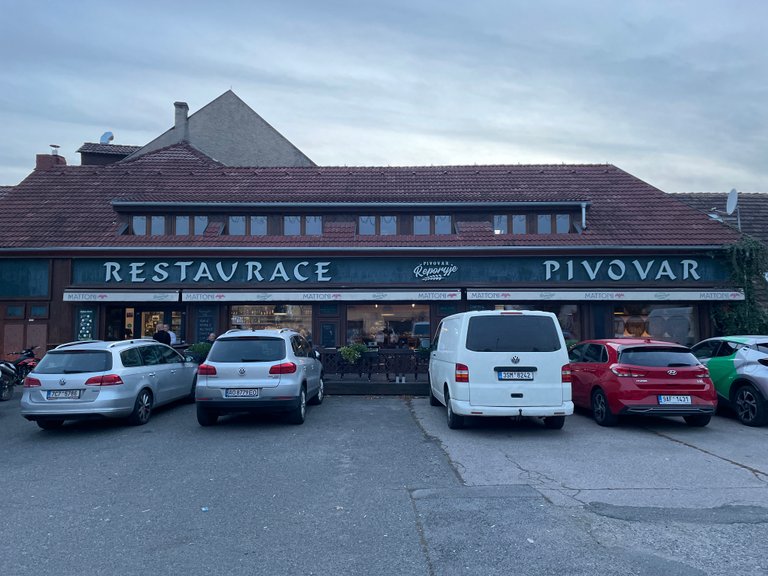
The microbrewery in Řeporyje, on the outskirts of Prague, fills a niche as a blend of the two Slavic cultures: a typical Czech microbrewery run by Ukrainians, offering a cultural center for the latter. I was recommended this place a few weeks ago, and once I was nearby, I decided to give it a shot, despite some recent reviews complaining about the staff and service in general. Many Czechs are not as welcoming as I am—some are even hostile toward foreigners, particularly Ukrainian refugees—and I had a feeling those reviews were somewhat biased. Well, let's find out, shall we?
Řeporyje určitě znáte. Kdysi vesnička, pak městys a poslední půlstoletí pražská městská část má nejznámějšího starostu v Česku, který se pravidelně objevuje v médiích. A možná, že enfant terrible regionální politiky přispěl i k tomu, aby se z místního minipivovaru stalo ukrajinské kulturní a společenské centrum, ať už přímo, nebo nepřímo. V mých kruzích kolují fámy, že se tam vaří ukrajinská kuchyně pro Ukrajince, a tak by byla škoda tenhle podnik nenavštívit, když už mě povinnosti zavály poblíž. A to navzdory některým nedávným recenzím, které si třeba stěžují, že ta obsluha je nějaká divná.
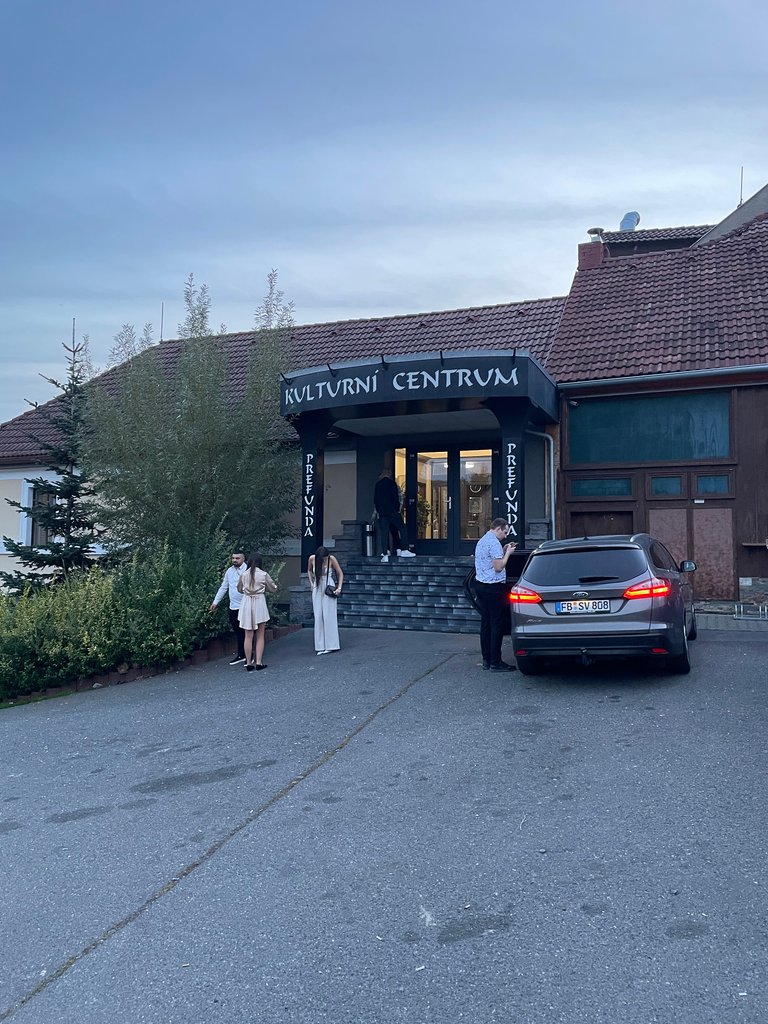
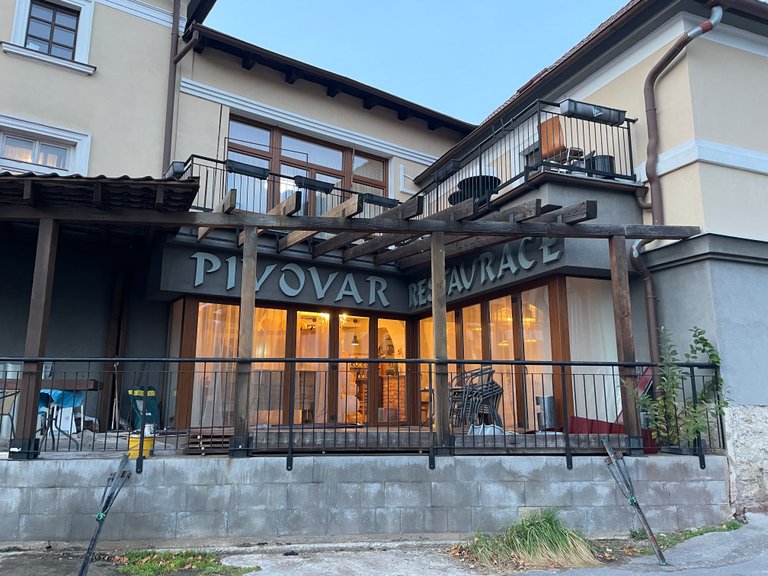
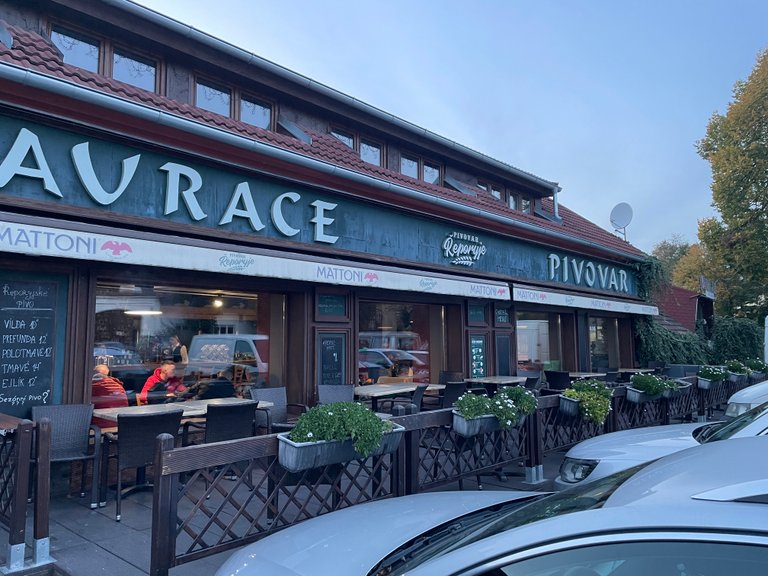
The rumors turned out to be true. When I arrived, a wedding party was underway in the cultural hall, occasionally spilling thirsty peers over into the taproom. The wedding guests were uneasy with a random guy taking pictures, so I respected their privacy—after all, who would take photos of people without their consent? After a brief chitchat and offering my best wishes to the newlyweds, I found myself a seat in the corner of the long, narrow taproom, eager to sample the local brews and the Ukrainian dishes that accompanied several international and Czech options on the menu. Everyone around swore it tasted just like home. I am no expert on Eastern Slavic cuisine, so I played it safe and stuck to the recommendation: shashlik with homemade spicy sauce. A good choice, I must say. And now for beer!
Pověsti o tom, že jde o ukrajinský podnik, rozhodně nepřehánějí. V kulturním sále byla zrovna svatební veselka, do okolí duněla ukrajinská diskotéka a rozjaření svatebčané se občas zatoulali i do výčepu. Byli fajn, ale na focení se moc netvářili, a já samozřejmě nebudu fotit někoho, kdo si to nepřeje. A tak jsem se posadil do kouta úzkého dlouhého výčepu a objednal si na jejich doporučení marinovaný šašlik s domácí salsou. Nebo omáčkou? Ve východoslovanské kuchyni se nevyznám, ukrajinský šašlik od jiných nepoznám, ale rád budu věřit, že chutnal jako na Ukrajině. Protože chutnal dobře. A teď už je čas na pivo.
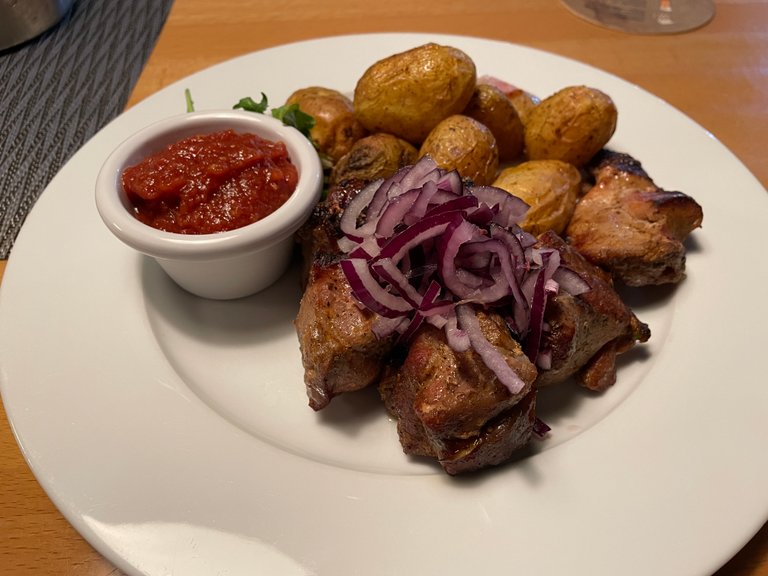
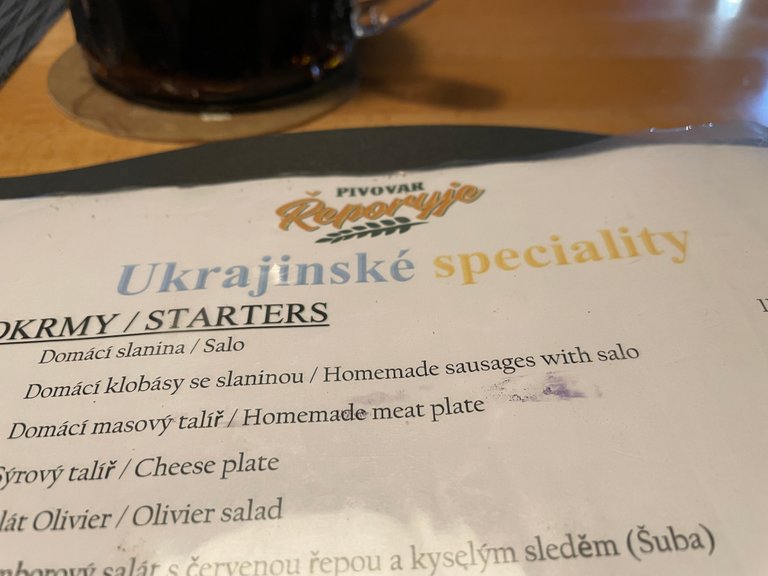
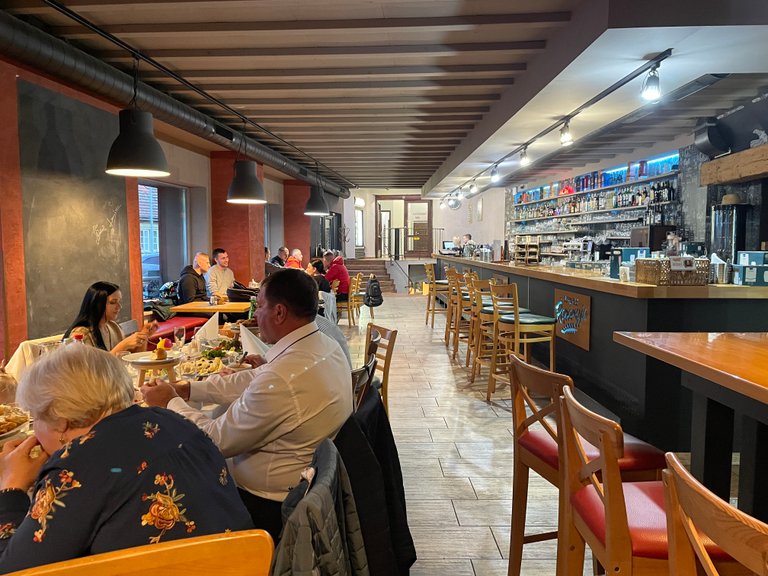
12° Prefunda, Bohemian Lager
I was surprised by how subtle the aroma of this lager is—you can only detect it if you bring your nose almost to the glass. However, the first sip is overwhelming. The Saaz hops kick in and linger, completely dominating the palate. Malt tones are muted, barely emerging in the sip. As a result, the brew feels slightly unbalanced and too hoppy, even for me, who generally prefers heavily hopped beers.
Překvapilo mě, že Prefunda skoro nevoní, musel jsem strčit nos pomalu až do pěny, abych ucítil jeho aroma. I přesto byl první doušek pořádný nášup, pivo je hodně chmelené a hořké. Žatecké chmely nepustí ke slovu nic dalšího, je to prostě hořký, zemitý kousek. Jakkoli mám moderní bohatě chmelené ležáky rád, tohle už mi přišlo trochu přes čáru, nějak mi tu chyběla rovnováha chutí.
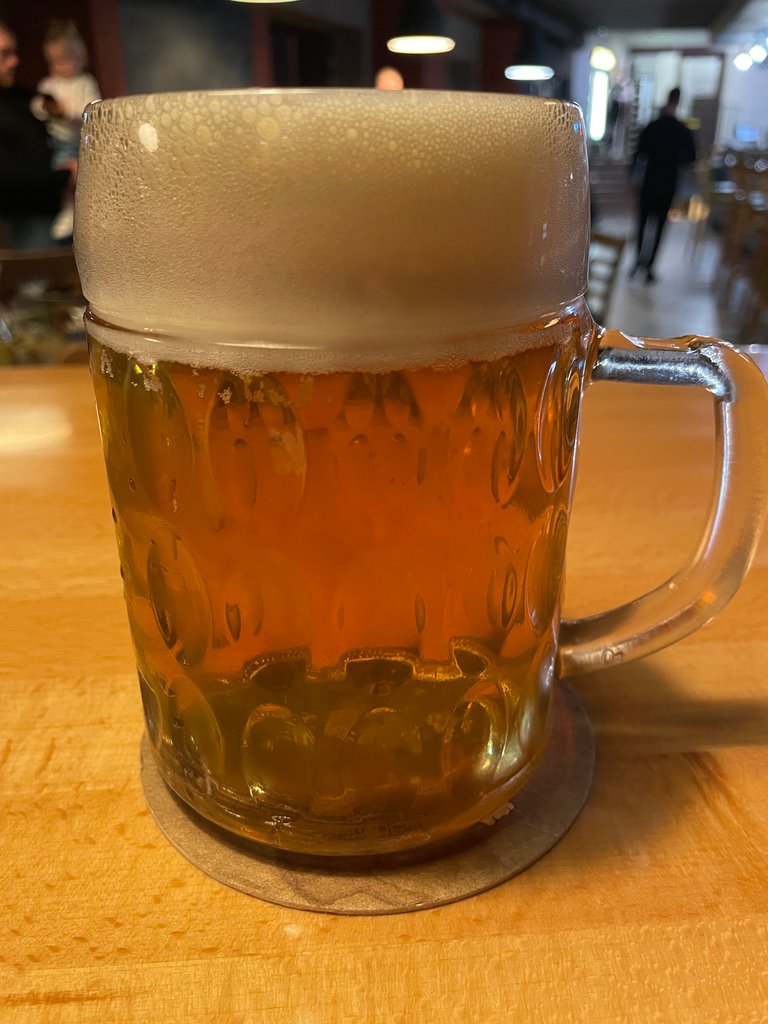
14° Dark Lager
My initial impression was that this was a genuinely good beer, brewed just in time—Czechs often drink stronger dark lagers as winter seasonal specials. The beer opens with sweet caramel and dark roasted coffee notes, followed by a hint of licorice esters. The finish highlights malty tones, but then a suspicious acidity appears. I'm quite sure this wasn't intentional, as it doesn't seem to fit. What a pity—it could have been an outstanding brew!
Na první dobrou je tohle skvělý speciál. Uvařený právě včas, protože se blíží Vánoce, ke kterým silná tmavá piva tak nějak patří. Tedy myslím, jeden japonský koncern na to prý má jiný názor. V prvním doušku hraje karamel a až přepražená káva, pak přijde trocha lékořicových esterů. Ocas jde do sladkých sladových tónů, ale pak se objevila zvláštní nakyslá pachuť, která do tohohle piva nepatří. Nevím, co se nepovedlo, ale je to opravdu škoda. Jinak by to bylo super pivo. Snad se jiná várka podařila lépe, u řemeslných pivovarů se stává, že sem tam něco uteče.
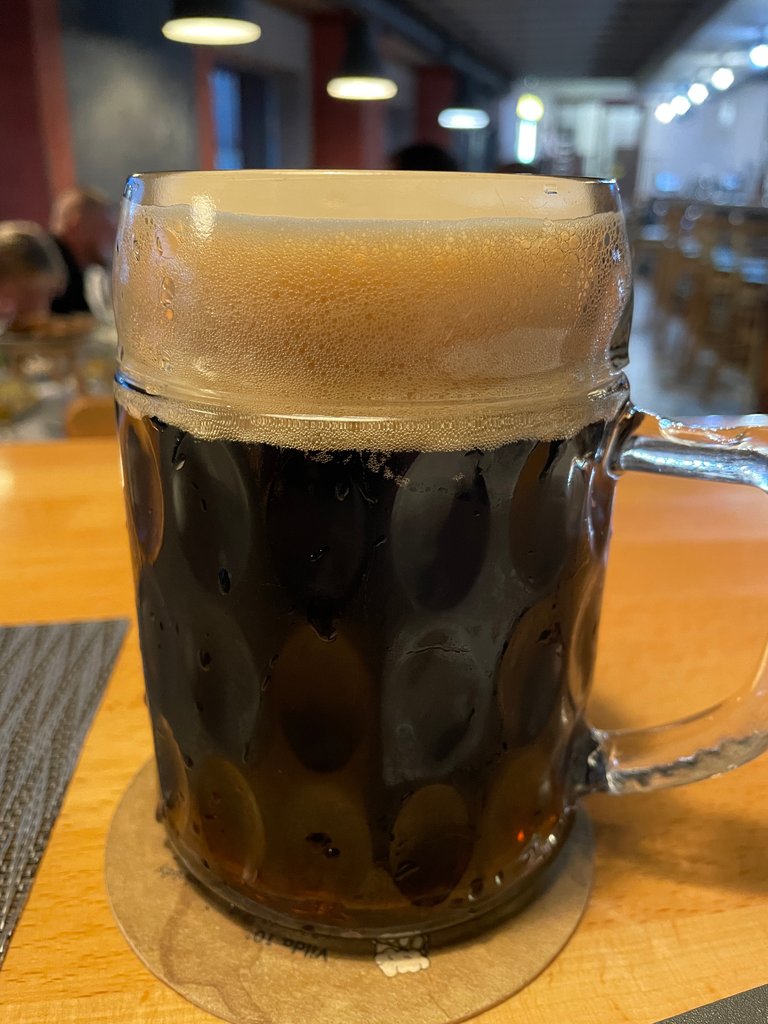
12° Ejlík, International Pale Ale
The top of the three. This easy-drinking ale blends Czech and American hop varieties, offering a pleasant herbal aroma with subtle fruit tones. It’s not as fruity as many ales, presenting a complex palette of mild bitterness with a slight hint of mango and honey. The bittersweet, honey-like aftertaste doesn't linger long, making you take another sip. Quite an unusual brew—I haven’t had many similar beers.
Vítěz koštu. Dobře pitelný mezinárodní ale, který v sobě snoubí české a americké chmely, voní hezky zemitě a trošku po ovoci. Oproti mnoha jiným podobným pivům není moc do ovocna, zemité bylinkové aroma doplňují mango a med. Hořkosladký medový dojezd nevydrží na jazyku dlouho, ale povzbudí k dalšímu doušku. Přijde mi to jako dost atypické pivo, ale moc dobré. Rozhodně doporučuju.

This is my #BeerSaturday challenge post, and I would like to invite @stayoutoftherz to participate. I am sure there are Austrian brews he would find refreshing :) Write a post in any language about beer with at least 3 pictures. It does not have to be published on Saturday. Check the rules published by @detlev ;)
Posted Using InLeo Alpha



